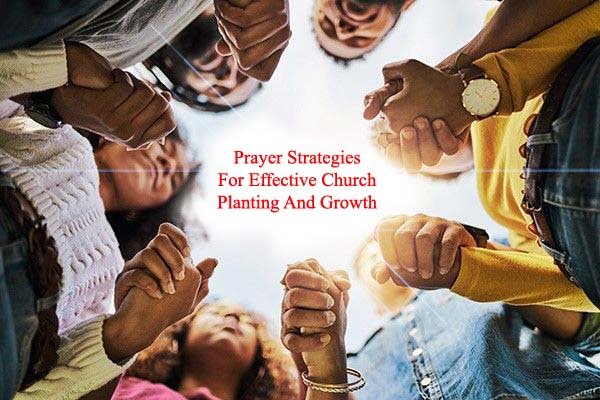In every local assembly, the place of strategic prayer cannot be overemphasized. Every church that desires to fulfill its God-given mandate must embrace intentional and Spirit-led prayer approaches. However, there is no one-size-fits-all prayer strategy that works for every church. Several factors make each church’s prayer emphasis unique:

- Every local church has different spiritual demographics – no two assemblies are the same in terms of membership composition.
- Each congregation has a unique redemptive calling – this includes their God-given purpose, destiny, and spiritual gifts for their region.
- Cultural and denominational backgrounds influence prayer dynamics – the way prayer is approached often varies depending on denominational practices and cultural expressions.
- The level of spiritual maturity in a congregation will determine what kinds of prayer strategies are effective and how they should be applied.
We must understand that there are various expressions and formats of prayer initiatives. No one type of prayer is more powerful than the other – whether it’s worship-based prayer, intercessory prayer, spiritual warfare, or thanksgiving. Many churches make the mistake of focusing only on one type of prayer, but we must embrace the full counsel of God on prayer.
The style and expression of prayer in a local church are influenced by:
- Leadership structure
- The age range and diversity of the members
- The surrounding community
- Denominational affiliation
- Ethnic and cultural background
- Geographical location
All these factors will help determine how prayer should be structured and nurtured within the church.
BIBLICAL GUIDELINES FOR BUILDING A PRAYING CHURCH
To grow a local church into a true “house of prayer for all nations” (Isaiah 56:7), here are key principles to follow:
- Informed Prayer
Equip the church with accurate, relevant prayer points. Make sure prayer teams and intercessors have updates and testimonies to build faith. - Prayer is the Responsibility of the Whole Church
Prayer is not only for the “prayer warriors” or intercessors. Every believer is called to “stand in the gap” (Ezekiel 22:30). Pastors should teach the church that corporate prayer is a family responsibility. - Sustained Prayer
One-off prayer events won’t drive out darkness. Churches must cultivate a lifestyle of consistent and fervent prayer (1 Thessalonians 5:17). The enemy will not relinquish territory easily. - Organized Prayer
Spontaneity in prayer is good, but structure is also vital. Appoint prayer coordinators who will oversee the prayer ministry. Planning prayer times and setting targets bring effectiveness. - Prayer Networks
Churches should not operate in isolation. Build relationships with other churches and ministries to form united prayer networks in your city or region—crossing denominational lines for kingdom advancement.
Recommended Reading
Building A Healthy Home In Ministry
Developing The Fruits of the Spirit
30 Reasons Why People Marry Wrongly
Tribalism And Ethnic Division In The Body Of Christ
EXAMPLES OF STRATEGIC PRAYER INITIATIVES
These strategies can be implemented within the local church, across a city, or regionally:
- Prayer Watches (24/7 Prayer)
Set up continuous prayer chains or watches. This could be around the clock (24/7), or structured into shifts. It can be done within one church or through a city-wide network. - Prayer Groups and Cells
Small group prayer gatherings remain one of the best ways to mobilize the church for prayer. However, multiplication is key! Don’t allow a single group to run for 5–10 years without raising new leaders or expanding to reach other groups (young people, mothers, business leaders, etc.). - Fasting and Prayer Seasons
Designated periods such as 3-day, 10-day, 21-day, or 40-day fasts help stir spiritual hunger and bring breakthroughs. This can also be adopted at the city or denominational level. - Half-Night and All-Night Prayer Meetings
These intensive prayer gatherings create space for deeper intercession, spiritual warfare, and communion with God. - Special Focus Prayer Groups
These are groups that intercede for specific needs—missions, pastoral covering (prayer shields), outreach campaigns, marriages, the poor, etc. - Diverse Prayer Expressions
Teach the church to engage in worship, intercession, and warfare prayer. Use the biblical types of prayer, not just the ones we’re comfortable with (see Ephesians 6:18, Philippians 4:6). - Special Prayer Teams
Form prayer teams that can handle sensitive or urgent issues in the church or community. These are usually short-term, issue-specific teams. - Use Prayer Informed by Research
Let your intercessory efforts be based on diagnostic research—data and insight about spiritual strongholds, community needs, or barriers to the gospel. - Prayer Walking
Prayer should leave the four walls of the church. Go into the streets, neighborhoods, schools, marketplaces, and workplaces to pray on-site. This is prophetic action, declaring God’s kingdom in physical spaces. - Praying for Felt Needs in the Community
Encourage members to pray for real, felt needs of their neighbors—sickness, joblessness, family problems, etc. This is how we become the hands and feet of Jesus. The “Prayer-Care-Share” lifestyle (used in the Light House Movement in the U.S.) teaches believers to pray for, care for, and share Christ with people. - Interceding for the Lost
Teach each member to choose and pray for five unsaved people—whether in their school, office, or neighborhood. Jesus came to seek and save the lost (Luke 19:10), and so should our prayers. - Pray Beyond the Church Walls
Churches often fall into the trap of only praying for their own survival or growth. Instead, raise intercessors who will pray for city transformation—covering politics, education, economy, justice, media, health care, environment, and more. These are the “mountains of influence” that shape society. - United Prayer Meetings
Regular citywide or regional joint prayer gatherings with other churches are crucial. These sessions reflect the unity of the Body of Christ and help release corporate anointing over regions (Psalm 133).
CONCLUSION
Effective prayer is the engine room of church planting and kingdom expansion. A praying church is a powerful church. When we raise praying congregations, we are aligning with heaven to bring God’s will to earth (Matthew 6:10). Let us build churches that truly become houses of prayer for all nations!
